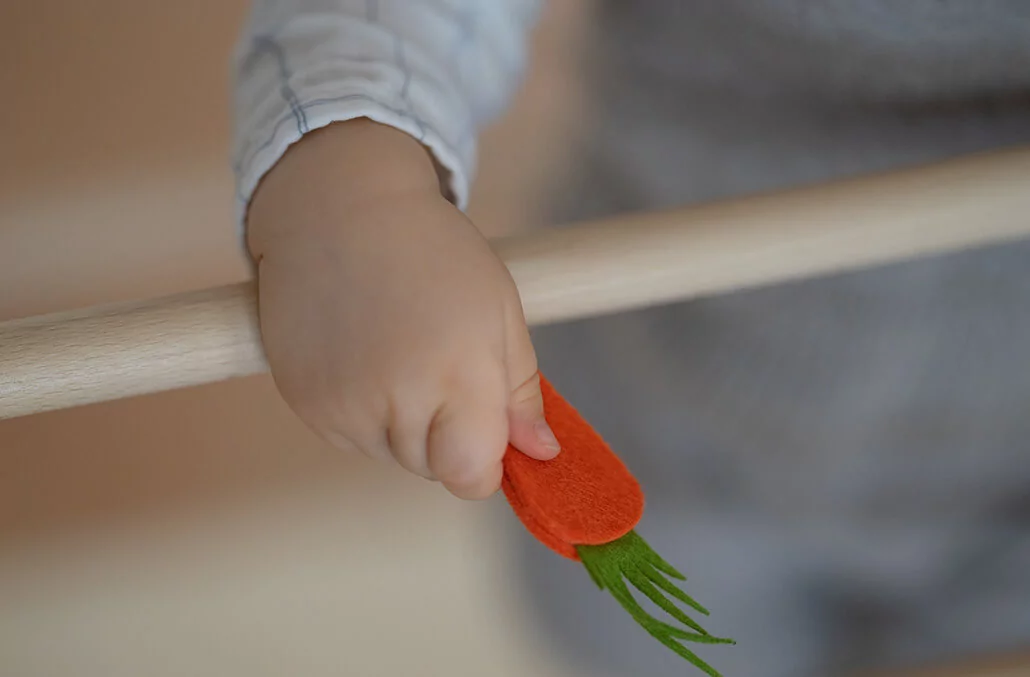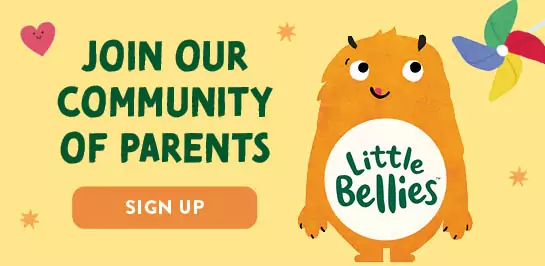Playing With Food Benefits: Developing Fine & Gross Motor Skills
Reading time:
Reading time:

Food is about nutrition as well as motor skills development.
At 3+ months of age, babies start kicking their legs and reaching for things while lying down. This helps strengthen their core muscles. At about 4 months, babies begin rolling and reaching for objects, which strengthens their back muscles. Strong core and back muscles help babies sit up and eventually walk. These skills are called gross motor skills.
The strength and stability of the core allow babies to practice and build fine motor skills like the pincer grasp, which requires coordination of many small muscles in their arms, wrists, hands and fingers.
Somewhere between 4 and 6 months of age, you will see the palmar grip. This occurs when your baby instinctively attempts to seize an object placed in their hand. Imagine your baby clasping onto your finger upon sensing it in their palm. The thumb will not be involved in this action yet.
At 6-7 months of age, you will see the Raking Grasp. As your baby is reaching for things and trying to bring them closer, you will see a raking motion, hence the raking grasp. This marks the start of the self-feeding phase.
At 7 to 9 months of age, you will see an earlier version of the pincer grasp, often called inferior or crude pincer grasp. In this developmental stage, your baby is still using the pads of their fingers, not the tips, but now trying to reach and hold on to things with their pointer finger and thumb. This allows them to pick up and hold smaller foods, which helps promote self-feeding and independence.
As the crude pincer grasp matures into a confident pincer grasp, you know your baby has reached an important development milestone. It is one of the fine motor skills and it could take 6-12 months to master. It’s quite complex: it requires a lot of hand-to-eye coordination for them to locate, reach, pick up and bring the desired object to their mouth. Picking up and holding small food objects forces them to leverage many small muscles in their hands and fingers.
A simple way to aid the development of a confident pincer grasp is playing with small-size foods and snacks like soft peas, carrot cubes or Little Bellies puffed snacks in the TASTY TEXTURES range for 7+ months babies.
Start with bigger pieces around 6 or 7 months of age, and make sure they are quick to melt in the mouth to avoid the risk of choking.
Consider using a mix of smaller and larger pieces. Small-size foods will help work their hand and finger muscles while the raking grasp will let them eat the larger pieces. With time, they will instinctively begin to use their index finger and thumb to pick up the food, thus using a pincer grasp.
Pincer Grasp is a building block for many future skills like holding a fork or a pencil. Hence it’s very important to master it and playing with food is one fun and natural way to do it.
Remember though that every baby has their own timeline and will develop their gross and fine motor skills at their own pace. Don’t worry or overthink this timeline. Don’t compare to other children. Some children take a little longer to develop a confident pincer grasp and that’s absolutely fine. Just let them be and have fun during the meal or snack times to practice the pincer grasp. If you’re worried about a delayed progression to pincer grasp, consult with a child development therapist. But also trust yourself and the natural process and enjoy being the parent!
With an extensive range of flavors, textures and shapes for every age, Little Bellies makes playing with food so much fun and so easy!
Read more about the role of playing with food in your child’s development in our next article Why is Playing with Food Important?
Photo by Sebastian Pandelache on Unsplash

Let’s Make It Official
Get the latest news on parenting tips, food play hacks, promotions and giveaways!
Subscribe Now